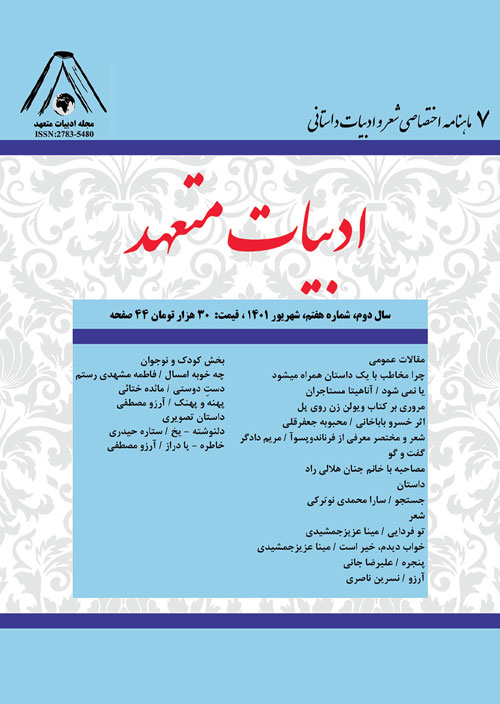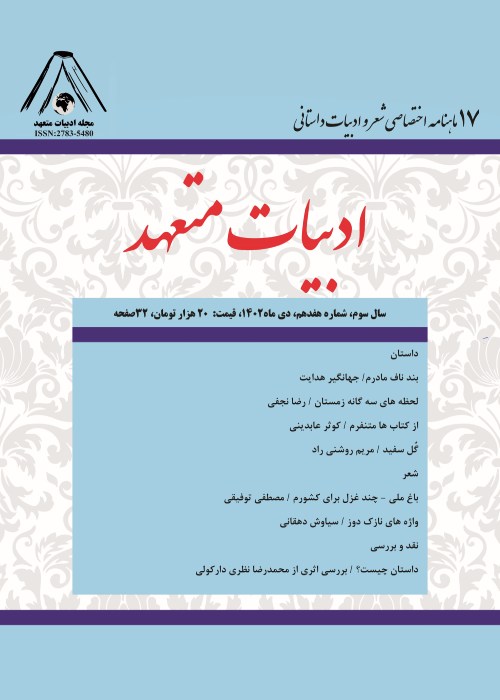فهرست مطالب

نشریه ادبیات متعهد
پیاپی 7 (شهریور 1401)
- تاریخ انتشار: 1401/06/30
- تعداد عناوین: 12
- مقاله عمومی
-
صفحات 6-7
در یک کلام، مخاطب باید به داستان وصل شود تا با آن همراه باشد. باید حس شراکت در داستان در وی ایجاد گردد. گویی این قصه، قصه ی خودش هم است. اما نویسنده چه کند که مخاطبش به این نقطه برسد؟ برای پاسخ به این سوال، چند قدم عقب تر رفته و می گوییم: اگر مداد من، خودکار من، ماشین من، دوست من، خویشاوند من، یا گلدان من آسیب ببیند بیشتر ناراحت می شوم، یا اگر مداد و گلدان یک نفر آنسوی کره ی زمین؟ هر چه ما با چیزی یا شخصی، نزدیک تر باشیم و احساس تعلق بیشتری نسبت به آن داشته باشیم، غلظت و شدت احساس ما نیز در موردش، بیشتر خواهد بود.
کلیدواژگان: همراهی مخاطب با اثر، مخاطب - نقد و بررسی
-
صفحات 8-13
این نوشته، نگاهی متفاوتی است به کتاب ویولون زن روی پل اثر خسرو باباخانی که در سال 1401، انتشارات جام جم آن را به چاپ رسانده است. این کتاب، تجربه زیستی نویسنده در خصوص مصرف مواد مخدر و رهایی از آن است. در صفحه ابتدایی کتاب، یادداشتی به خط نویسنده خوش می درخشد که آبرویش را در کف دست گذاشته تا مگر بتواند انسان دربند موادی را آگاه کند و راه ظلمت به سوی نور را نشان او دهد.* «من بیش از سی سال در ظلمت زیسته ام ، اما راهی به نورنمی یافتم. تا آنکه خداوند ولی من شد و من را از ظلمت به سوی نور هدایت کرد.«من این خاطرات را نوشتم تا راه را به چند میلیون مصرف کننده مواد مخدر نشان دهم. ممکن است بگویند شاید یک نفر راه بیابد. من می گویم در این صورت هم اجرم را گرفته ام. در مقابل رنج بی انتهای مصرف کننده ها و خانواده هایشان آبرو و اعتبار خانواده من چه اعتباری دارد؟ هیچ.»وابستگی مصرف به هر نوع مواد، گاهی می تواند سرسره ای غیر قابل برگشت باشد. مسیری که متوقف نمی شود .
کلیدواژگان: اعتیاد، روایت داستانی، ویولون زن روی پل، خسرو باباخانی - مقاله عمومی
-
صفحات 14-16
فرناندو په سوآ، نویسنده و شاعر مشهور پرتغالی است که در سیزدهم ژوین 1888 در لیسبون متولد شد. نام خانوادگی په سوآ در پرتغالی به معنای «شخص» است. شاعری که به تقسیم ادبی «خود» به چند «دیگرنام» مشهور است، چنان که می دانیم فرناندو په سوآ بسیار بیش از یک تن بود، یا شاید باید گفت که چندین و چند ذهن یا ضمیر در یک تن، یا شاید که خویشتن های یک تن بود. این «چندخویشی شخصیتی» به شعر او وضعیتی متمایز و موقعیتی یگانه می بخشد، «خودپراکنی» تا جایی که به ناچار این شعر ها را واقعا باید به عنوان شعر های چهار شخص و شخصیت متشخص و مشخص درنظر آورده و بپذیریم، هرچند از جهتی ظاهرا در این جا صحبت از همان شخصیت های پرداخته ی درونی ست که برخی شاید تمایزات ظاهر شده میان آن ها را به حساب تغییر و تحولات فردی و درونی شاعر در روند شاعری اش بگذارند، اما فراموش نمی شود که این شخصیت ها عموما و در بسیاری از سال ها عملا به طور هم زمان و موازی در ذهن و زبان شاعر حضور و دست به تالیف داشته اند.
کلیدواژگان: فرناندو په سوآ - گفت و گو
-
صفحات 17-20
آشنایی بیشتر با خانم هلالی راد و طرح برخی پرسش ها درباره مسایل اجتماعی نوجوانان تلاش گر علارغم دارای مشکل در بینایی انگیزه ای بود که درخواست گفتگو با ایشان را مطرح کنیم و حالا با سپاسگزاری از ایشان که این فرصت را در اختیار ما و خوانندگان محترم گذاشتند از ایشان می خواهیم که در آغاز ما و خوانندگان را بیشتر با خودشان آشنا کنند.
کلیدواژگان: جنان هلاللی راد - داستان
-
صفحات 22-27
- شعر
-
صفحه 29
-
صفحات 30-31
-
صفحه 32
-
صفحه 33
- شعر - بخش کودک و نوجوان
-
صفحه 36
- داستان - بخش کودک و نوجوان
-
صفحات 37-38
-
صفحه 39
-
Pages 6-7
In a word, the audience must be connected to the story to be with it. A sense of participation in the story should be created in him. It is as if this story is its own story.But what should the author do to reach this point?To answer this question, we go a few steps back and say: If my pencil, my pen, my car, my friend, my relative, or my vase are damaged, I will be more upset, or if the pencil and vase of someone on the other side of the planet?The closer we are to something or a person and the more we feel a sense of belonging to it, the more intense our feelings will be about it.
Keywords: audience -
Pages 8-13
This article is a different look at the book Violin Woman on the Bridge by Khosrow Babakhani, which was published by Jam Jam Publications in 1401. This book is the writer's biological experience regarding drug use and getting rid of it. On the first page of the book, there is a note in the handwriting of the author, who put his reputation in the palm of his hand so that he can inform the person who is surrounded by material and show him the path from darkness to light.* "I have lived in darkness for more than thirty years, but I did not find a way to light. Until God became my guardian and led me from darkness to light. "I wrote these memoirs to show the way to millions of drug users. They may say that maybe someone will find a way. I say that even in this case I have received my reward. In front of the endless suffering of consumers and their families, what is the reputation of my family? Nothing."Addiction to any type of substance can sometimes be an irreversible slide. A path that does not stop.
Keywords: The Violinist on the Bridge -
Pages 14-16
Fernando Pessoa is a famous Portuguese writer and poet who was born on June 13, 1888 in Lisbon. The surname Pesua means "person" in Portuguese. A poet who is famous for the literary division of "self" into several "other names", as we know, Fernando Pesua was much more than one person, or perhaps it should be said that there were several minds or pronouns in one person, or perhaps that he was the self of one person. This "personality multiplicity" gives his poetry a distinct and unique situation, "self-dispersion" to the extent that we must really consider and accept these poems as the poems of four distinct and specific characters, although apparently we are talking about the same characters here. It is an internal treatment that some may attribute the differences that have appeared between them to the personal and internal changes of the poet in his poetic process, but it should not be forgotten that these characters generally and for many years practically simultaneously and parallelly appeared in the poet's mind and language. have authored
Keywords: Fernando Pessoa -
Pages 17-20
Getting to know Mrs. Helali Rad and raising some questions about the social issues of hard-working teenagers, although I had difficulty seeing, I had a motive to ask for a conversation with her, and now I am grateful to her for giving us and our dear readers this opportunity. We want them to introduce us and the readers more to themselves at the beginning.
Keywords: Jenan Helali Rad -
Pages 22-27
-
Page 32
-
Page 33
-
Page 36
-
Pages 37-38


